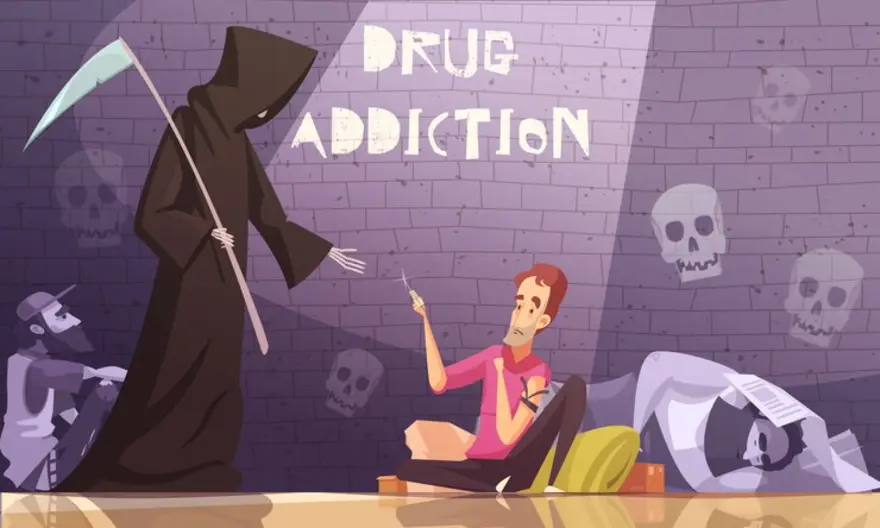Preventive Healthcare
Managing Drug Addiction: Prevention, Effects, Symptoms, and Treatment
7124 Views
0

Drug addiction is a widespread problem that affects not only your health but also your relationships and daily productivity. Therefore, screening tests for drug addiction are a crucial first step towards understanding the potential risks of drug abuse. After all, identifying the early signs is paramount in initiating effective drug addiction treatment. This is why this article discusses the what, why and how of drug addiction, drug overdose symptoms, and what are the steps you can take to overcome it. Read on!
What is Drug Addiction?
Drug addiction is described as a persistent and recurring condition marked by the uncontrollable pursuit and consumption of drugs. It is acknowledged as a neurological disorder, as it alters the functioning of your brain circuits associated with reward, stress, and self-regulation.
Addiction vs. Misuse and Tolerance
Unlike drug addiction, misuse involves using a substance in ways not intended or prescribed. While misuse may not always lead to addiction, it can contribute to health risks such as heart disease, stroke, sleep disorders, etc., and functional impairment. Tolerance, on the other hand, refers to your brain's diminishing response to a substance over time, therefore requiring higher doses to achieve the same effects. While tolerance and misuse can precede drug addiction, they do not guarantee it.
What are the Effects on Your Brain?
Drug addiction effects can be profound. Different substances can affect your brain in various ways, but common drug addiction effects include:
- Drugs often alter the release, reuptake, or reception of neurotransmitters, disrupting normal communication between your neurons.
- Many drugs stimulate your brain to release dopamine, creating a pleasurable sensation. This reinforcement can lead to repeated drug use.
- Prolonged drug use can impact your decision-making, learning, and memory.
- Increased risk of mental health disorders like schizophrenia, bipolar disorder, depression, etc.,
Who's Most Likely to Become Addicted?
The susceptibility to drug addiction varies among individuals due to a complex interplay of genetic, environmental, and psychological factors.
- Genetic predisposition plays a significant role. If you have a family history of addiction, you may be more vulnerable.
- Variations in your brain chemistry and structure can influence how you respond to drugs over time.
- Exposure to drugs at an early age, trauma, and a lack of familial or social support can increase the risk.
- Peer influence, particularly during adolescence, is a crucial factor. This happens as individuals experiment with substances to fit in or cope with social pressures.
- Psychological conditions, such as depression, anxiety, or ADHD, can elevate the risk of addiction.
- Self-medication with drugs to alleviate emotional pain or stress can also lead to dependency.
What are the Signs of Drug Addiction?
Common signs of drug addiction include :
- Your physical appearance and hygiene can decline. Observable physical symptoms may include dilated pupils, changes in appetite, unexplained weight loss, and alterations in sleep patterns.
- You may experience noticeable mood swings and a lack of enthusiasm.
- You will find it challenging to cut down or quit drugs despite recognizing their negative impact.
How to Prevent Addiction to Prescribed Painkillers?
Preventing addiction to prescribed painkillers can be achieved by:
- Educating yourself about the prescribed painkillers, including potential side effects and the risk of dependence
- Talk to your doctor to limit the duration and dosage of opioid painkillers, especially for acute conditions, if possible. Short-term use is generally preferred to reduce the risk of dependency.
- Properly dispose of any unused medication to prevent accidental or intentional misuse by yourself or others.
- Explore non-pharmacological pain management options such as physical therapy or acupuncture.
Drug Overdose
A drug overdose occurs when you ingest a quantity of a substance that exceeds your body's ability to metabolize it. Overdoses can result in severe health complications, including respiratory failure, coma, or even death.
Drug Overdose Causes
Common drug overdose causes include:
- If you have a high tolerance to a substance, you may consume larger amounts to achieve the desired effects. This increases the risk of inadvertently surpassing your body's safe threshold.
- Mixing drugs amplifies the risk of overdose due to unpredictable interactions.
- Insufficient awareness about the dose, potency, and side effects of a drug can contribute to accidental overdose.
- Misuse of prescription medications
- Pre-existing health conditions, particularly liver or kidney dysfunction, can make you more susceptible to overdose, even with normal doses.
Drug Overdose Symptoms
Common drug overdose symptoms include:
- Respiratory Problems
- Unresponsiveness
- Uncontrollable convulsions or muscle spasms.
- Confusion or Agitation
- Bluish Skin or Lips(Cyanosis)
- Vomiting or Gurgling Sounds
- Cold or Clammy Skin
- Enlarged pupils, unresponsive to light
Drug Overdose First Aid
- Dial emergency services immediately to report the overdose and provide accurate information about the drug overdose.
- Stay calm and assess safety.
- Check if the person is responsive. If unresponsive, try to wake them and assess their breathing gently.
- If breathing is absent or irregular, initiate CPR (Cardiopulmonary resuscitation) with rescue breaths. Continue until emergency help arrives.
- If the overdose involves opioids, administer naloxone if you have it and are trained to use it.
- Keep the person comfortable and monitor vital signs until emergency help arrives.
Can Drug Addiction Be Prevented?
Yes, drug addiction prevention can be achieved through a combination of education, early screening, behaviour changes, and treatment if necessary. Drug addiction prevention methods typically involve:
- Identifying and addressing risk factors early in life, such as childhood trauma, mental health issues, or family history of substance abuse, can significantly reduce the likelihood of addiction.
- Comprehensive drug education programs targeting schools, communities, and families can raise awareness about the risks and consequences of substance abuse.
- Biological samples such as saliva, urine, or blood can reveal the presence of drugs or their metabolites in the body, providing evidence of recent drug use for early screening.
- Drug addiction treatment and prevention typically involves supervised detoxification, Cognitive-Behavioural Therapy (CBT), Dialectical Behaviour Therapy (DBT), and other evidence-based behavioural therapies.
- Drug addiction treatment also involves prescribed medications to reduce cravings, alleviate withdrawal symptoms, or block the effects of certain drugs.
- Governments and institutions can contribute by implementing and enforcing policies and regulations restricting access to harmful drugs.
What are the Consequences of Ignoring Drug Addiction?
There can be various consequences of ignoring drug addiction:
- Health deterioration
- Strained relationships with family, friends, and colleagues
- Increased risk of overdose
- Mental health decline
- Social isolation
Conclusion
Drug addiction can spiral out of control if not addressed early. With a blend of medical interventions, behavioural therapies, and strong support networks, you can easily ensure recovery and rediscover a life free from the shackles of substance abuse. If you or your loved ones are suffering from drug addiction, do not hesitate to reach out to Metropolis Healthcare for a prompt and precise urine or blood test to detect the concentration of drugs in the body and prevent overdose. Metropolis Labs also provides hassle-free at-home testing with the service of our experienced phlebotomists, providing you with the best diagnostic services across India. Book your test today!













1701259759.webp)









 WhatsApp
WhatsApp